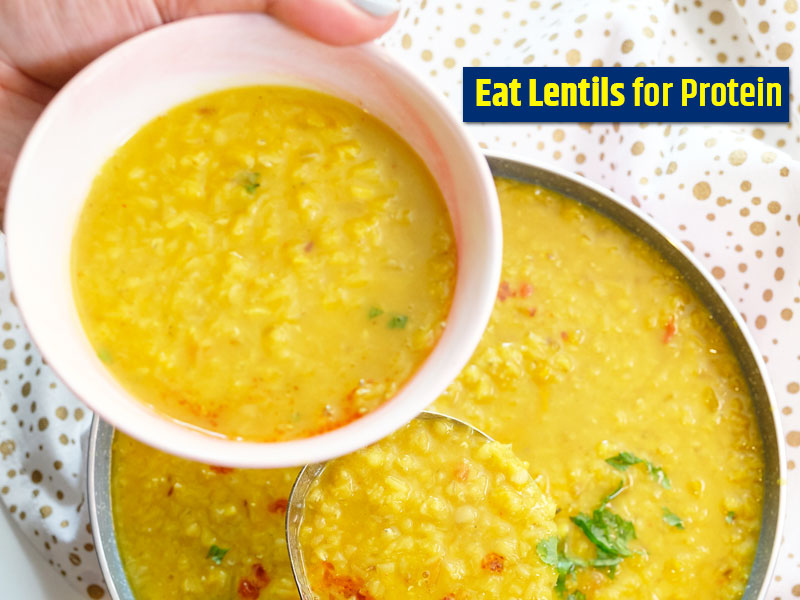
Why is protein a buzz word today? The answer is simple. Protein is an extremely important macronutrient which plays a huge, in fact, unparalleled role in keeping us healthy, fit and disease-free. Protein from food breaks down to amino acids. We also need enough protein to keep our immunity strong and prevent diseases. Not many people get the connection of protein with strengthened immunity and this is one oversight that can mess up the immunity of so many of us. Know what Kavita Devgan, Nutrition Expert, Tata Sampann has to say about the right amount of lentils to have for proteins:
Table of Content:-
Are you eating enough protein?
It’s a sad truth that many of us don’t get enough protein, and are clearly deficient in this life saving nutrient. Common signs of protein deficiency are:
- Slow metabolism
- Loss of muscle mass
- Fatigue
- Tiredness
- Brain fog
- Mood swings, muscle
- Pain in joints
- Low immunity
Proactively ensure that the diet is rich in the optimal amount of protein every day, as this nutrient is not stored in the body, so it is needed on a daily basis.
So why are lentils important for protein?

Protein deficiency is rampant today in our country, and there are multiple reasons for it. Lack of information and lack of availability of good protein sources are the two most common ones. Lentils are great source of protein. One must consume good protein, ample fibre and sufficient nutrients to boost their overall health and pulses offer all three of these. Besides, when compared to other protein sources, pulses are cheaper and good in quality. Vegetarians must consume pulses daily to amp up their health. As per Kavita Devgan, 250ml of cooked lentils provide about 15-18 grams of protein which is excellent.
Also Read: Protein Is A Must In Your Diet, Here’s How You Can Increase Its Intake
Benefits of Lentils
Apart from delivering daily protein, lentils deliver benefits too. Here are some of the best health benefits of eating lentils:
- Their substantial fibre fills you up
- These keeps your gut happy
- Lentils help improve heart health by lowering cholesterol levels
- Plus most pulses are high in potassium, which helps lower blood pressure by counteracting the effects of sodium
- They also deliver iron, zinc, folate, selenium and magnesium, all of which help further.
How to eat lentils correctly?
The Indian way of nutrition diktats eating lentils at least once, sometimes twice a day too, and traditional diets followed this religiously. Today though this habit is also being discarded like many other good habits. It’s time to correct this mistake and make them a big part of our diets again. Follow these smart rules for lentil eating to ensure that they deliver Sampan Sehat.
- The first rule here is to include variety in your diet. There are multiple kinds of lentils available to us across India, and we must make sure we eat them all by rotation to score their specific benefits in turn.
- The second rule is to go for leaner protein options over high-fat versions. Dals are a lean source of protein (compared to animal protein), so they do not mess up our lipid profile.
- The third rule is to opt only for quality, packaged lentils from a trusted brand and avoid loose dals. This will ensure good hygiene and also help avoid unnecessary and unwanted harmful additives (found in loose dals) that may harm our health.

Also Read: Eating Red Lentils or Masoor Dal Aids Weight Loss, Know Other Health Benefits
While choosing lentils, always check for unpolished pulses. The ones that look bright and appealing might be polished and unsafe for health. They may have a shining smooth surface which makes it easier for you to distinct them. Unpolished pulses are less shiny and slightly rough but they are packed in nutrients.
It’s time to take lentils seriously as a good source of protein, as lack of protein could actually prevent you from leading your most efficient life, both personal and professional.
With inputs from Kavita Devgan, Nutrition Expert – Tata Sampann
Read More Articles in Healthy Diet
Inside images source- freepik.com
Also watch this video
How we keep this article up to date:
We work with experts and keep a close eye on the latest in health and wellness. Whenever there is a new research or helpful information, we update our articles with accurate and useful advice.
Current Version